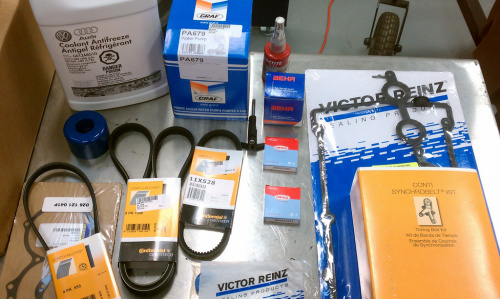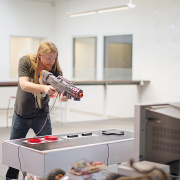How far do you go down the DIY Rabbit Hole?
What are your "yourself" limits when it comes to DIY? What do you value when in your project and what are you looking to accomplish when you "do it yourself"?
Once again I haven't had the time to make any progress on any of my projects worthy of the blog. However, you'll be happy to know that all toilets in my house are once again fully functional! So the conundrum I pose today is how much "yourself" is appropriate in do-it-yourself? If it sounds like a pub-type question – that's because it is. It's a conversation spurred by like-minded DIYers over the usual bar fare.
It all started over a question you may have asked or may have been posed to you: "How do I learn electronics?" My answer is always, "it's not a simple question." I then usually proceed to the down the rabbit hole metaphor. I explain that before you learn electronics, you need to know what you need to learn, which in itself requires some knowledge of electronics.
This then leads to the question, "What do you need to know?" To explain: What processes and concepts do you need to know, and what can just be assumed in a "black box" or "known quantity" aspect? This, too, is a difficult question. It's comes down to a balance of want, need and willingness.
So most people who are reading this hold electronics in some respect as a hobby. I would assume that very few are into electronics for the sake of electronics (Director of Engineering Pete Dokter being an outlier). Your interest in electronics stems from another interest or hobby, be it art, audio, robotics or just about anything else (although sometimes it's the other way around). A do-it-yourself mentality goes together with most hobbies. At some point you're going to want to learn how something is done or made. The reasons for such include having that experience, holding that knowledge, or a myriad of other reasons. But when are you too far down the rabbit hole?
I personally am someone who holds many interests and hobbies. It's to the point where time is at a premium. If I want to work on my car, it's going to cut into the other number of hobbies I keep up with. So where do I draw the line? What level of work do I put into my car and what do I leave up to a mechanic?
Balancing Resources
The cost benefit analysis of a project – most notably time vs money. When is it worthwhile for you to build something from the ground up, and when is an off-the-shelf solution better? I've seen some knife makers forge their own blades from bog ore.
In other hobbies, is that level of work necessary? If you're building you own PC, would you forge or shape your own heatsink? That's an answer you need to decide. What is your goal for the project? Do you want a solution or do want the knowledge that comes with doing the project (or both)? Maybe you're looking for a custom solution, something that works in the exact way you want it to. It may not be the most cost-effective method, but DIY could be your only way. You need to consider the bigger picture of what you are looking to accomplish with a project.
Sometimes it's about the Journey
DIY isn't always about saving money or getting your perfect result. Sometimes it's about process. Whether the desired result is gaining knowledge, saying you did it, or simply enjoying the experience. My personal view is to give a try at least once. If it works for you, keep doing that part yourself. If it doesn't, you have the knowledge that goes along with the final result, and you're able to make more informed decisions when using off-the-shelf solutions.
To go back to my working on the car example, a few years back I did the timing belt maintenance on my car. At the time it was to save some cash, but I was also eager to learn the concepts associated with it and the bragging rights of saying I did it. It was a bit outside of what I normally worked on with my car, but I was up for the challenge. In the end, it took a day and half, the back of my hands were covered with cuts from the radiator, and due to a mistake on my part I had to have someone with the correct tool verify that the timing was correct. However, it gave me the knowledge I had hoped to gain from the project. In the future, I plan on leaving this to a mechanic, but if need be, I have the ability to do it myself.
While doing it yourself for the experience is all well and good, beware of Yak Shaving. Yak Shaving refers to what you are doing when you're doing some stupid, fiddly little task that bears no obvious relationship to what you're supposed to be working on, but yet a chain of twelve causal relations links what you're doing to the original task. It can easily derail any project you're working on, should your willingness to complete the project become lacking. I'm personally being affected by Yak Shaving in one of my DIY projects. I'm building a PC and have my components picked out and funds ready to go. But right now I'm working on choosing the right type of pipe to use for desk legs for a desk I want to build to house this PC. So while I'm building a PC, I'm looking at different types of plumbing pipe. My want to make this happen is keeping things moving, but it could possibly cause me to table the project of building a PC indefinitely.
Taking Pride in your Ability
Sometimes DIY is about becoming really good at creating something. It's not a one-time solution or about saving money, but rather an activity that you enjoy and are able to take pride in the final product.
The point I'm trying to convey is that there are many directions and approaches to doing something yourself. Nobody can tell you when you're taking too much of the project upon yourself or when it's not worth doing. That's for you to evaluate. Of course, it's good to get advice and do your research beforehand, and listening to those who have done that task before can be helpful.
So what do you guys do yourselves? I admit, part of this is me wondering what other hobbies and activities our customers do. But are there parts of your hobby that you do or build yourself that others might rely more heavily on off-the-shelf solutions? What are your DIY limits? How far down the rabbit hole are you willing to go and why?









